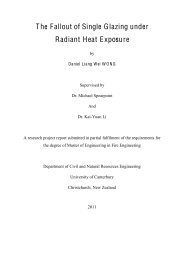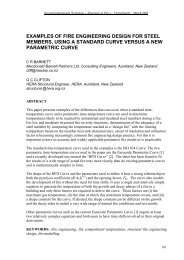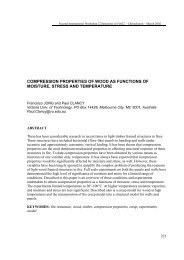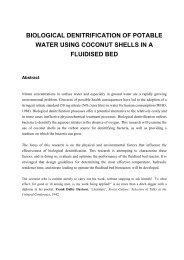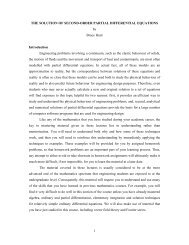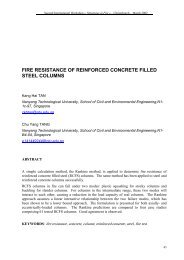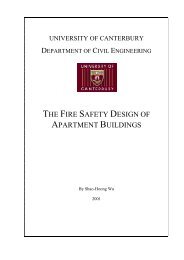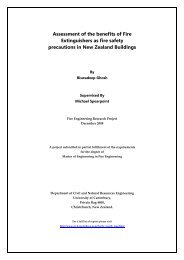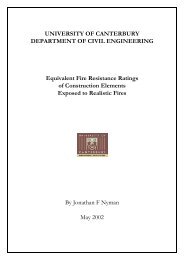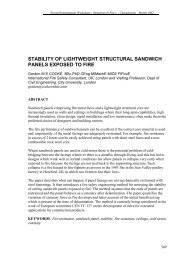University of Canterbury Department of Civil and Natural Resources ...
University of Canterbury Department of Civil and Natural Resources ...
University of Canterbury Department of Civil and Natural Resources ...
You also want an ePaper? Increase the reach of your titles
YUMPU automatically turns print PDFs into web optimized ePapers that Google loves.
4 <strong>Department</strong>al Policies <strong>and</strong> Procedures<br />
4.1 Overview<br />
The <strong>University</strong> <strong>of</strong> <strong>Canterbury</strong> has a range <strong>of</strong> formal regulations printed in the<br />
Calendar. These regulations range from those associated with assessment <strong>and</strong><br />
enrolment to specific regulations for the BE (Hons) degree. The Calendar is the<br />
definitive source <strong>of</strong> information regarding these <strong>University</strong> wide regulations, <strong>and</strong><br />
you are encouraged to familiarize yourself with the regulations that are particularly<br />
relevant to your programme <strong>of</strong> study. In particular it is your responsibility to be<br />
conversant with the BE (Hons) regulations <strong>and</strong> the regulations regarding Aegrotat<br />
consideration.<br />
In addition, the <strong>Department</strong> <strong>of</strong> <strong>Civil</strong> <strong>and</strong> <strong>Natural</strong> <strong>Resources</strong> Engineering has a range<br />
<strong>of</strong> policies <strong>and</strong> procedures that are relevant to students studying in this department.<br />
It is important that you underst<strong>and</strong> these policies <strong>and</strong> procedures. Please take the<br />
time to read this section early in your time with the <strong>Department</strong>.<br />
4.2 Resolving Problems<br />
Most students at one time or another during their study encounter a problem <strong>of</strong><br />
some sort. The <strong>Department</strong> wants to help you resolve these problems as quickly as<br />
possible. The following people within the <strong>Department</strong> can be approached to help<br />
you.<br />
• Undergraduate administrator<br />
• Your course lecturer<br />
• Your course co-ordinator<br />
• Students on your student liaison committee<br />
• Your pr<strong>of</strong>essional year co-ordinator<br />
• The Director <strong>of</strong> Undergraduate Studies<br />
• The Head <strong>of</strong> <strong>Department</strong><br />
It is recommended that you approach the person who is most likely to be able to<br />
help. For example, if you have an administrative problem talk to the undergraduate<br />
administrator. If you have a course problem the lecturer or course co-ordinator<br />
would be the first people to speak to. Approaching the Head <strong>of</strong> <strong>Department</strong><br />
generally should be your final recourse.<br />
4.3 Assessment<br />
Assessment plays a major role in your studies <strong>and</strong> it is vitally important that you<br />
know how the assessment process works. Each course you undertake will use a<br />
range <strong>of</strong> assessment tools, generally involving some internal assessment, in the<br />
form <strong>of</strong> assignments, laboratories, projects <strong>and</strong> tests, <strong>and</strong> a final examination. The<br />
internal assessment will probably contribute towards your final grade for a course,<br />
31<br />
`



